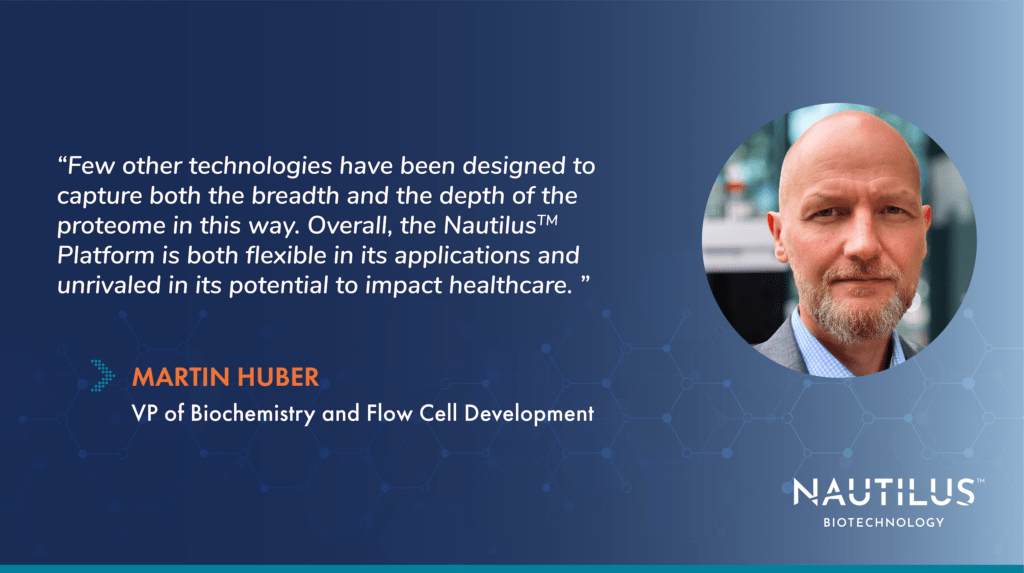
Interview with Martin Huber – VP of Biochemistry and Flow Cell Development

Tyler Ford
December 12, 2023

Martin Huber recently joined the Nautilus team as VP of Biochemistry and Flow Cell Development. He comes to Nautilus with an extensive career focused on next-generation sequencing and single-molecule tools. He has dedicated himself to making new technologies accessible to researchers who can use them to vastly accelerate developments in diagnostics, drug development, basic research, and more.
Having spent many years focused on genomics as a scientist, founder, and CEO, Martin is excited to join the Nautilus team where he’ll once again be at the leading edge of biotech. He believes the NautilusTM Platform can democratize proteomics through its unrivaled potential to analyze singe protein molecules in a massively parallel and scalable way.
Read on to learn more about Martin’s transition from genomics to proteomics and discover why he believes in Nautilus’ potential.
Transitioning from genomics to proteomics
I started working in genomics when next-generation sequencing technologies were just getting off the ground. As the third hire at Ion Torrent Systems, I worked with a team that saw the potential of genomics to change healthcare and we were energized to make it much easier to sequence genomes. The recent completion of the Human Genome Project made it clear that there was a ton of potential in DNA sequencing, but we needed to make it more accessible and far less expensive to sequence full genomes. We wanted to enable a paradigm shift in healthcare that has largely come to fruition in the form of genome-based diagnostics, treatments, and research initiatives.
After Ion Torrent Systems was acquired by Life Technologies, I knew my work in the sequencing space wasn’t finished. NGS workflows were still cumbersome and time consuming. Seeing this very practical problem, I founded my own company, Quantapore, to solve it and further democratize the genome. We made tremendous progress, and I began to look to other areas that were ripe for innovation. I didn’t want to make incremental advances in DNA sequencing, but instead wanted to work on something that could, once again, upend the status quo in biotech and biology research.
The proteome was then and still is glaringly understudied and immensely important, yet we still don’t have the tools necessary to explore it. Thus, when Quantapore was acquired, I dug into the landscape of next-generation proteomics companies and Nautilus clearly stood out as a potential game changer.
The NautilusTM Proteome Analysis Platform’s potential to match the scale of the proteome
Surveying the next-generation proteomics space, Nautilus stood out because of its incredible potential to analyze proteins across the dynamic range of the proteome in a massively parallel way. You absolutely need the ability to isolate and analyze billions of proteins at once to get a comprehensive view of the proteome and Nautilus’ tech has been built with this fact in mind from its inception.
Beyond its massive scale, the Nautilus Platform also has the potential to dive into the depths of the proteome through targeted proteoform analysis at the single-molecule level. Few other technologies have been designed to capture both the breadth and the depth of the proteome in this way. Overall, the Nautilus Platform is both flexible in its applications and unrivaled in its potential to impact healthcare.
Clear focus and alignment across the Nautilus team
When I visited Nautilus, it became clear that the leadership are all highly dedicated to the goal of delivering comprehensive proteomic analysis and they constantly work to keep their teams aligned on that goal. Having been a scientist, founder, and CEO, I know that it can be difficult to balance the needs of researchers, board members, investors, and other stakeholders while remaining focused on common goals and communicating those goals clearly. The Nautilus team has a rare clarity and focus that energizes me.
Potential applications of the NautilusTM Platform
I cannot wait to see how our work upends the status quo in biology. Honestly, it’s impossible to predict the impact our technology will have given how little we know about the proteome and the inaccessibility of current proteomics technologies. When we succeed, I believe our technology will be more impactful than next-generation sequencing because we’ll provide researchers and clinicians with the unprecedented ability to understand the functions and dynamic nature of the true drivers of biology, proteins.
MORE ARTICLES
